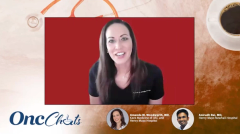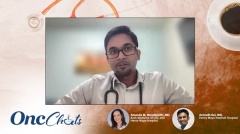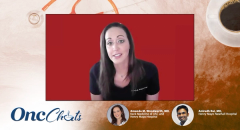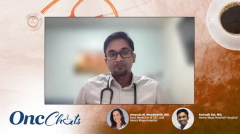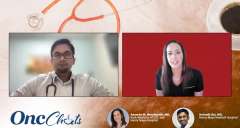
Empowering Community Cancer Care: Survivorship and Support Programs
In this episode of OncChats: Empowering Community Cancer Care, Dr Woodworth sheds light on the “Road to Recovery” survivorship program at Henry Mayo, which supports cancer survivors by providing them with fitness, education, and mental health resources.
Episodes in this series
In this episode of OncChats: Empowering Community Cancer Care, Amanda M. Woodworth, MD, of Keck Medicine of USC at Henry Mayo Newhall Hospital, sheds light on the “Road to Recovery” survivorship program at Henry Mayo, which supports cancer survivors by providing them with fitness, education, and mental health resources, and underscores the importance of mentorship programs for community providers to ensure equitable cancer care.
Woodworth: We’ve also been able to bring in some other amazing programs with Keck Medicine. Number one, we have an amazing survivorship program—we call it “Road to Recovery.” We’ve actually partnered with Henry Mayo Fitness and Health on this one, which is our own gym and physical therapy/occupational therapy, and it is actually classes for survivors—not just breast cancer, but all types of cancer—[that allow them] to be able to come in and learn about the late effects of the cancer treatments, both physically but also emotionally and mentally. A lot goes into the treatment of cancer, and [there is a lot that] the caregivers [need to know, as well]. Then, we also [provide] guided exercise with the exercise specialist at Henry Mayo Fitness. [So], survivors [can do] guided exercises under the safety and eye of an exercise specialist. That’s been an amazing program that we’ve been able to offer for the survivors of this area, and that’s been very well received. We’re also able to work with palliative care and social work with Keck and bring those things, as well of some end-of-life care in the home, to the patients who need those resources.
As such, there is a lot that we are able to offer by number one, partnering with Henry Mayo, but also bringing some of the resources from the main academic site up here. Our patients can really benefit from all of those [initiatives,] but by partnering along with Henry Mayo, we can actually provide sometimes more and [offer] that care right in the community. As I mentioned at the very beginning [of our discussion], over 85% of cancers are identified within the community. But this has been a little bit of a tough road, because although this is true, sometimes we see a big difference in the treatment in the community vs an academic center. It’s really interesting. Dr Rai, I’ve been seeing more [efforts from the] academic standpoint, but as well as a national standpoint [focused on] how do [to provide] better care in the community.
In fact, there have been different mentorship programs that have been started for mid-career physicians, which, sadly, I’ve learned that that is me. But the American Society of Clinical Oncology, American College of Surgeons, and Surgical Society of Oncology, have all started these mentorship programs, and in fact, I’m honored to actually be part of the Surgical Society of Oncology’s inaugural program, specifically as a community provider. That’s what these programs are starting to do: mentor other community surgeons or other community cancer providers to show them how we can do better, and really spread the word within the community and make sure that all patients in the community are getting the same standard-of-care [treatment] that we can [provide] in the academic setting. It’s really neat, and I’m very excited to be part of this.


